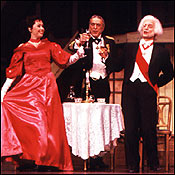
Basking in the unaccustomed luster of an elegantly appointed theater, the New York Gilbert & Sullivan Players are in the midst of their annual January season, this time at City Center, a big change from their modest but comfy home of the past 22 years, Symphony Space on the Upper West Side, which is now under renovation. Perhaps to ease itself into new surroundings, the troupe has this year chosen to present the three most popular works of the canon: H.M.S. Pinafore, The Pirates of Penzance, and, coming up this weekend, The Mikado. That seems to be just fine with the city’s G&S aficionados, who turned out in force for the opening-night performance of Pinafore.
Needless to say, all the usual NYGASP virtues were on display: respect for the work’s traditions and the creators’ original intentions, along with generous amounts of contemporary invention, energy, and flair. Of course, there are some benighted folk who remain allergic to the timeless satire and musical fizz of the Gilbert and Sullivan operettas however they are served up, and for them I can feel only sorrow and pity. What astonishes me each year is how fresh and vital NYGASP’s approach remains, no doubt thanks to the skill and unquenchable enthusiasm of Albert Bergeret, the chief conductor and stage director of the company since its founding in 1974.
Two NYGASP veterans were welcome passengers aboard this Pinafore. Stephen Quint as Sir Joseph Porter is the ideal G&S patter-song comedian: elfin, waspish, agile, and blessed with a pleasantly lean-textured voice that articulates notes and words with absolute clarity. His baritone foil as Captain Corcoran, Keith Jurosko, also gives the music full value while portraying this befuddled man with deliciously understated comic style and elegance. Easy to hear and lovely to look at, Kimilee Bryant and Michael Scott Harris made an attractive pair of vacuous young lovers, while Philip Reilly (Dick Deadeye) and Angela Smith (Buttercup) played the heavies with a nice light touch. A trip to The Mikado is recommended, especially for traditionalists who greeted the City Opera’s recent loony updated production with modified rapture.
Even Lincoln Center is not quite sure how the final installment of its Rachmaninoff Revisited project was miraculously rescheduled this month in toto after being disrupted by the tragic events of last September. Important musicians are generally booked up years in advance, and orchestras do not ordinarily cross the Atlantic on a moment’s notice, but here was London’s Philharmonia conducted by Vladimir Ashkenazy in Avery Fisher Hall as originally planned to give fresh perspectives on eight major Rachmaninoff works, some familiar and others virtually unknown.
Indeed, the first program offered three rarities that most listeners were probably visiting for the first time. The Fourth Piano Concerto is seldom heard, partly because it lacks one of those great audience-pleasing hit tunes so associated with Rachmaninoff’s three previous concertos. Even when the composer revised the score after a less than ecstatic reception in 1927, it found few champions, and the original version, which Alexander Ghindin played at this concert, only reconfirms the impression of a confused piece that never quite knows what it wants to say.
As for The Bells and Three Russian Songs, those two choral scores are genuine masterpieces that would surely impress even the most rabid Rachmaninoff detractor. Both tap deeply into this composer’s national roots, which remained vital despite years of residence in America. Beyond that, they also show his undiminished creative skill – and sheer originality – in ways that can still astonish us.
H.M.S. Pinafore
New York Gilbert & Sullivan Players, conducted by Albert Bergeret.
Rachmaninoff Revisited
London Philharmonica, conducted by Vladimir Ashkenazy, at Avery Fisher Hall.